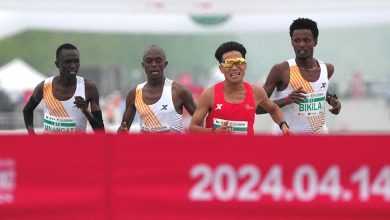A Healthy Danielle Collins Arrives in the Australian Open Semifinals

MELBOURNE, Australia — Danielle Collins has played exceptional tennis to reach the semifinals of the Australian Open, but only after achieving the victory of being “able to feel like a normal person.”
Less than a year after an endometriosis diagnosis led to the removal of a tennis-ball sized cyst from her uterus, as well as tissue from her bladder and bowels, the 27th-seeded Collins surged past Alizé Cornet, 7-5, 6-1, in a Wednesday afternoon quarterfinal match in Rod Laver Arena.
“The advice that I had gotten over the years is that painful periods are normal, taking anti-inflammatories on a regular basis is normal,” Collins said. “I felt like it was something that I just had to deal with. It finally got to the point where I couldn’t deal any longer with it physically or mentally.”
“Once I was able to kind of get the proper diagnosis and the surgery, I feel like it’s helped me so much — not just from a physical standpoint, but from a mental standpoint,” she added.
Collins was able to return to competition seven weeks after surgery, at last year’s French Open.
Cornet said Collins’s play had been even more powerful and stifling than she had expected.
“Her ball is going really fast in the air, and she takes the ball super early,” Cornet said. “All the time you feel really oppressed. I felt out of breath all the time. I couldn’t, like, place my game. She just never let me do it, never gave me the time to do it. Yeah, she’s impressive.”
Before the match, Cornet had compared Collins, known for roaring encouragement at herself on court, to a lion but said afterward: “Today I don’t think I gave her enough battle so she could express herself.”
Collins returns to the semifinals three years after making her only other Grand Slam singles semifinal appearance here. Cornet was playing in her first quarterfinal in 63 Grand Slam main draw appearances. She said that her run had given her a newfound appreciation for the challenge of advancing deep into a tournament like the Australian Open.
“I have eternal respect for the Grand Slam winner because it’s such a long way; my God, I have the feeling I’m playing this tournament for a year,” Cornet said. “I’m so exhausted mentally, physically. When you go all the way and win these freaking seven matches, it’s just huge.”
In a Thursday evening semifinal, Collins will face the seventh-seeded Iga Swiatek of Poland, who needed more than three hours to beat the Estonian Kaia Kanepi, 4-6, 7-6 (2), 6-3, later Wednesday afternoon.
Thursday’s first semifinal will pit the top-seeded Australian Ashleigh Barty against the unseeded American Madison Keys. If Collins and Keys both win, it will set up the first all-American final in Melbourne since Serena Williams beat her sister Venus in 2017.
Collins, 28, first reached the semifinals here three years ago in a breakout run that confirmed her arrival from collegiate standout at the University of Virginia to elite professional.
Apart from her physical improvements, Collins said that some of her biggest mental growth came in late 2020 on a very different surface: when the American doubles specialist Bethanie Mattek-Sands took her rock climbing in Arizona.
Collins, who has a long-held fear of heights, said she was “terrified” by the “what ifs” of rock climbing, but that the stakes involved — even with ample safety equipment in use — made tennis seem relaxing by comparison.
“Halfway through it I realized every time I step out on the court, it’s not life or death,” she said. “For people in rock climbing, it can be. That was a really big realization for me and something I think helped me grow to kind of step out of my comfort zone and try something I had never done before, something that I was really scared of doing. That was a huge moment of growth for me.”
The comeback win marks a new area of growth for Swiatek, who burst into the top echelon of the game when she raced to the 2020 French Open title without dropping a set. Working on winning when not playing her best has been an area of focus for Swiatek and her traveling sports psychologist, Daria Abramowicz.
Last season, Swiatek only came back to win after losing the first set three times in 13 matches.
“I’m proud of myself that I’m still able to find solutions and actually think more on court on what to change, because before it wasn’t that clear for me,” Swiatek said. “It’s part of the work that we have been doing with Daria to control my emotions and just maybe actually focus on finding solutions.”



